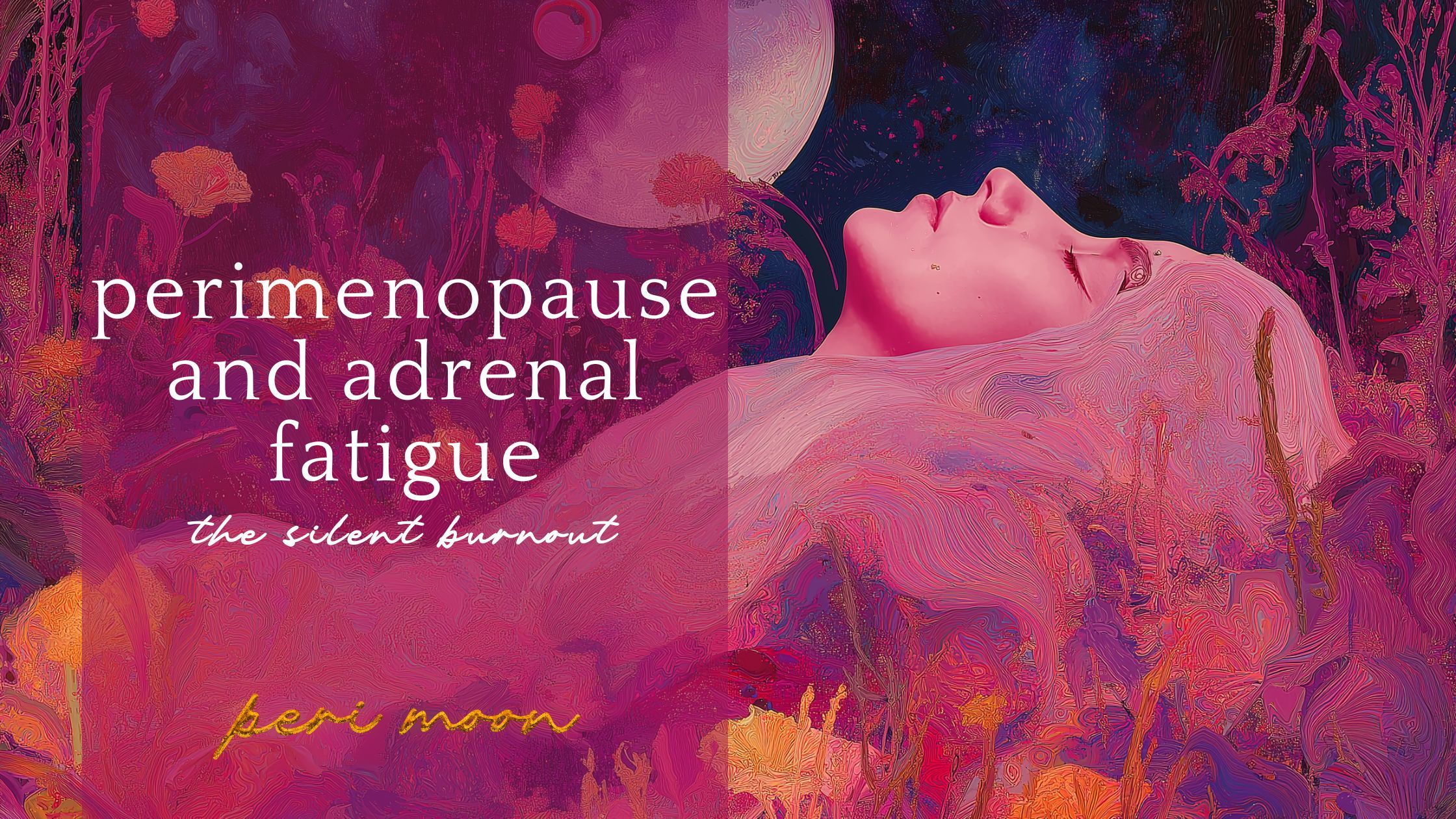Perimenopause and Adrenal Fatigue: The Silent Burnout
Feb 13, 2025
There’s a moment in a woman’s life -perhaps you’ve already felt it- where exhaustion becomes your baseline. Not the kind that a good night’s sleep can fix. Not the kind that passes with a cup of coffee or a slow morning. This is something deeper, heavier. A bone-deep depletion that no amount of willpower can override.
This is not just tiredness. This is adrenal fatigue.
And if you are in perimenopause, your adrenal glands have just been called to the front lines.
What Are the Adrenals, and Why Do They Matter in Perimenopause?
Your adrenal glands are two tiny powerhouses that sit atop your kidneys. Their job? To produce cortisol (your stress hormone), adrenaline (your fight-or-flight response), and, critically, a small but significant supply of sex hormones like oestrogen and testosterone.
When your ovaries begin their gradual retreat during perimenopause, your adrenals are meant to step in, picking up some of the hormonal slack. But there’s a problem.
Many women enter perimenopause already burned out.
Years of stress, overextension, and running on empty have left the adrenals depleted before they ever get their chance to help.
And now, as oestrogen and progesterone fluctuate unpredictably, the adrenal glands - already taxed from years of high cortisol output - are too exhausted to provide the backup support your body needs.
The Connection Between Perimenopause and Adrenal Fatigue
Perimenopause is a time of recalibration; your body acclimating to a new hormonal reality. But if your adrenals are already struggling, this transition becomes even harder.
Here’s what adrenal fatigue looks like in perimenopause:
- Deep, unrelenting exhaustion. Even after sleeping, even after resting.
- Increased anxiety and overwhelm. Your body has been pumping cortisol for so long that it no longer knows how to regulate it.
- Blood sugar crashes. Sudden irritability, dizziness, or intense cravings for sugar and carbs.
- Disrupted sleep. Waking at 3 a.m., unable to drift back into rest.
- Weight gain, especially around the belly. When the body perceives stress, it holds onto fat as a survival mechanism.
- Brain fog and forgetfulness. Because high cortisol disrupts memory processing and cognitive function.
And then there’s the emotional side—something no lab test can measure, but every woman can feel.
A sense that you are running on fumes. That you have nothing left to give. That no matter how much you rest, you are still so tired.
Why Perimenopause Demands That You Heal Your Adrenals
In the past, when women reached this transition, life slowed down. They were no longer the ones up all night with babies or working long hours to sustain a household. There was space to listen to their bodies, to honour the shift.
But modern life does not make space for perimenopause.
Instead, many women hit their 40s still juggling careers, raising children, tending to ageing parents, managing relationships, and carrying everyone else’s needs before their own.
Your body, however, does not care about your to-do list.
It will force you to slow down. Through exhaustion. Through anxiety. Through symptoms that demand your attention.
The question is: will you listen?
How to Support Your Adrenals During Perimenopause
Healing adrenal fatigue is not about doing more. It is about doing less. It is about rebuilding trust between you and your body.
Here’s where to start:
- Nourish Before You Caffeinate
- If you’re reaching for coffee before food, your adrenals are paying the price.
- Start the day with protein, healthy fats, and fibre to stabilize blood sugar and cortisol.
- Prioritise Deep, Restorative Sleep
- Adrenal repair happens at night. If you are waking up exhausted, your body is not getting the deep repair it needs.
- Create a sacred sleep ritual—turn off screens, dim the lights, and give your nervous system permission to unwind.
- Balance Blood Sugar Like It’s Your Job
- Rollercoaster blood sugar leads to cortisol spikes, which over time, lead to burnout.
- Eat protein and healthy fats at every meal to keep your body from perceiving starvation (aka stress).
- Move Gently, Not Aggressively
- Overexercising when you’re in adrenal fatigue can make it worse.
- Swap high-intensity workouts for strength training, walking, and yoga.
- Breathe, Rest, Receive
- If you cannot remember the last time you did nothing, your nervous system is in overdrive.
- Practice restorative stillness—meditation, deep breathing, journaling, simply being.
- Say No Without Justifying It
- If you are constantly overcommitted, your adrenals will never recover.
- Start saying no without guilt. Without explaining. Without the need for validation.
Boundaries are adrenal medicine.
The Power of the Pause
There is no quick fix. No supplement that overrides a lifetime of stress. No diet that erases depletion overnight.
There is only this: slowing down, listening, and choosing a different way.
Your body is not breaking. It is begging you to stop running, to stop pushing, to stop overriding its wisdom.
Perimenopause is not just a hormonal shift. It is a reckoning. A final chance to decide:
Will you continue to pour from an empty cup? Or will you finally let yourself be held?
You cannot heal in the same way that made you sick.
And perhaps, it’s simply time to let go of the idea that exhaustion is the price of being a good woman.
If you long for a luscious, heart-centred community and wisdom hub for women in perimenopause, join the Peri Moon app.

